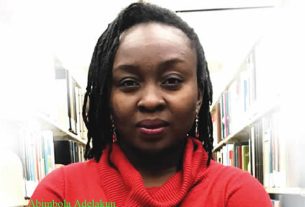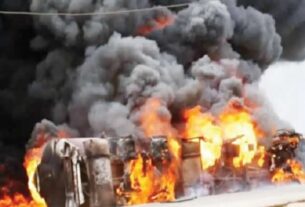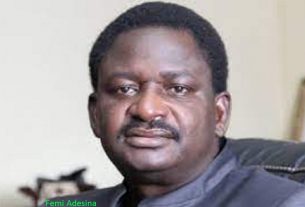Photo: Pius Utomi Ekpei / AFP
Monsignor Martins carried out the task with his accustomed fairness.
Born in Lagos in 1910, he was the grandson of a Brazilian slaver. His paternal grandmother was an ethnic Hausa. He grew up in a household that observed Christian and Moslem traditions. This background would seem to explain his approach to his work as a priest, soldier, and public servant, indeed his entire life.
He was religious without being dogmatic or doctrinaire.
Alhaji Mamman Ali Makele was born on August 20, 1940, Agbaja, Kwara State; Education: Secondary School, Okene, 1954-59, King’s College, Lagos, 1960-61, University of Ibadan, 1962-65, Graduate School of Public and International Affairs, University of Pittsburgh, USA, 1969-70, University of Wisconsin, USA, 1970, University of Kent, Canterbury, 1985-86, University of London, 1986-87; Assistant Executive Officer, Ministry of Establishment, Lagos, January —September, 1962;Assistant Executive Officer, Cabinet Office, Lagos, June — September, 1963; Assistant Executive Officer, Parliament, Lagos, June — September 1964; Assistant Secretary, Federal Ministry of Economic Development, Lagos, July —October, 1965; Administrative Officer, University of Lagos, 1965-67; Assistant Registrar/Principal Assistant Registrar, Unilag, 1967-76; Director, Nigerian Ports Authority, 1971-75; Commissioner for Economic Development, Kwara State, 1975-77; member, Constitution Drafting Committee, 1976-77; Deputy Registrar, University of Lagos, 1976-80; Chairman, Leventis Group of Companies Scholarship Committee, 1976-80; Chairman, Public Accounts Committee, Kwara State, 1977-79; Director and Chairman, Chase Merchant Bank Nigeria Limited, 1977-80; Acting Cabinet Minister, Department of Steel Development, Office of the President of Nigeria, 1980-81; Cabinet Minister for Steel Development, 1981-83; Political Parties: member, defunct Northern Peoples Congress Students’ Wing, University of Ibadan, 1963-65; member, National Executive Committee, banned National Party of Nigeria, 1978-83; member, Kwara State Economic Planning Board, 1972-75.
Alhaji Mamman Daura, was born on the 9th November, 1939 in Daura, in the present day Katsina State. He started his education at the Daura Elementary School, 1946-1949, Katsina Middle Secondary School, 1949-1954, Bournemouth College of Technology, England, 1958-1962, Trinity College, University of Dublin, Eire, 1962-1966, 1968; employee, Daura Native Authority, 1955-1958, programme assistant, Nigerian Broadcasting Corporation (NBC), Kaduna, 1958, deputy secretary, Executive Council of Northern Nigeria, 1967-1968, Senior Assistant Secretary, Political Section, Military Governor’s Office, 1969, Editor, New Nigeria, 1969, Managing Director, New Nigerian Newspapers, 1974-1976, member, Board of Directors, News Agency of Nigeria, 1978, later appointed Chairman, Nigeria Television Authority, 1986; member, NBC Committee of Inquiry, 1970-1971, member, Committee of Inquiry, Broadcasting Company of Northern Nigeria, 1974, member, State Drought Relief Committee, 1974, chairman, North Central State Campaign against Drug Addiction and Allied Evils, 1974, member, Governing Council, Nigerian Institute of International Affairs, member, Manufacturer’s Association of Nigeria, director, Nigerian Building Society, director, Dunlop Nigeria Industries since 1974, director, Northern Nigeria Investments since January 1974, appointed chairman, Board of Directors, Bank of Credit and Commerce International (Nigeria)Ltd.
Dr. Obi Wali (27 February 1932 – 26 April 1993) was an intellectual giant compared to his height. Dr Wali would take you on intellectual voyage and you will never be the same again.
The manner of his death is still a shock to me till today. He was violently murdered and dismembered at home in his bedroom by suspected hired assassins on 26 April 1993. Dr Obi Wali was in the league of intellectuals like S.G. Ikoku, Chief Bola Ige, Dr. Ibrahim Tahir, Comrade Ola Oni, Gani Fawehinmi, Kanmi Ishola Osobu, Odia Ofeimun, Dr. Bala Usman, Professor Godini Gabriel Darah (75), Comrade Laoye Sanda, Professor Akin Oyebode, Arthur Nwankwo, Chinua Achebe, Professor Wole Soyinka, Dr. Tai Solarin, Kole Omotosho, Professor Ladipo Adamolekun, Professor Bayo Williams (road to Kigali), Professor Ralph Akinfeleye and a host of others too numerous to mention. They all live, in a world of ideas.
Dr Obi Wali was a member of the Constituent Assembly.
In 1979, he was elected Senator to represent Port Harcourt Senatorial zone of Rivers State. Other Senators elected to represent Rivers state at that time were Senators Fracis Ajie, John Ellah (Ahoada/Ikwere/Etche, Gbene Cyrus Nwidonane Nunieh (Bonny/Bori), O. Eberewariye (Degema) and Amatari Zuofa(Brass/Sagbama/Yenogoa).
Dr Obi Wali later became the deputy NPP Senate leader to Senator Jaja Anucha Nwachukwu (1 January, 1918- 7 November 1996) from Aba. That was when I became his friend. His intellectual contributions in the Senate, were exceptional. In 2014 the Obi Wali International Conference Centre was opened to the public in Port Harcourt, Rivers State, created and named in the memory of Obi Wali’s political and literary contributions. Till today, the Ikwerre people organize an annual memorial lecture in Obi Wali’s honor.
Dr Obi Wali’s Committee did not recommend the creation of a State Police. What the committee recommended was The Sub-Committee in discussing the structure of the police for the country raised the question whether the unified Police system, now in operation, accords with the spirit of federalism. The preponderance of sentiments however was for the continuation of a unified structure.
However, while the Sub-Committee favours the continuation of a unified Police Structure for the country, it believes that a different arrangement from what now obtains should be made in the operation use of the Police. This is because each level of Government, central state and local has responsibility for the maintenance of law and order and each should share in the operational control of the Police commensurate with the level of its responsibilities. The Sub-Committee recommends that the Police force that operates at the local authority area should be under the operational direction of the local authorities, where such local authorities have been entrusted with the responsibility for maintenance of law and order.
Conflicts between the local authority and local police command could be resolved through a system of appeals, the police appealing through the State Command and local authority through the State Ministry of Local Government. It is also suggested that an advisory committee established at the local level could be used in useful discussing issues concerning the local authority/local Police relations.
The Sub-Committee discussed Section 106(4) of the 1963 Constitution which requires the Commissioner of Police of a region to comply with the direction of the Premier of a Region and that in case of disagreement with such direction, the Commissioner may request that the matter be referred to the Prime Minister of the Federation.
It was argued that the recourse directly to the Prime Minister rather than through the intermediary of the Inspector-General of Police undermines his authority as the Inspector-General has the constitutional responsibility for the operational control of the Police. However, it was agreed that it is not proper that any disagreement involving the Governor of a state be passed through the Inspector-General who is a public official.
The issue of possible conflict between the State and Central government on the control of police operations, especially where the state government concerned is from a party which is not the same as the party in control of the central government was raised. It was thought that this issue is not limited to control of police only and that it is a question of state/federal relations to be dealt with by the appropriate Sub-Committee”.
“There shall be a Police Force for Nigeria, which shall be styled the Nigeria Police Force 2. Subject to the provision of this Constitution, the Nigeria Police Force shall be organized and administered in accordance with such provision as may be made in that behalf by the legislature. 3. Subject to the provisions of this Constitution, the members of the Nigeria Police Force shall have such powers and duties as may be conferred upon them by any law in force in Nigeria.
No police forces other than the Nigeria Police Force shall be established for Nigeria or any part thereof.
5. The Legislature may make provision during emergencies for Police Forces forming part of the armed forces of the Federation, or for the protection of harbours, waterways railways and airfields.
6. There shall be an Inspector-General of the Nigeria Police and a Commissioner of Police for each state of the Federation, whose offices shall be offices in the Public Service of the Federation.
7. The Nigeria Police Force shall be under the command of the Inspector-General of the Nigeria Police.
8. The President or such other Minister of the Government of the Federation as may be authorised on that behalf by the President may give to the Inspector-General of the Nigeria Police such directions with respect to the maintaining and securing of public safety and public order as he may consider necessary and the Inspector-General shall comply with those directions or cause them to be complied with.
9. Subject to (3) above, the Commissioner of Police of a State shall comply with the directions of the Governor of the State or such other Commissioner of the Government of the State as may be authorised on that behalf by the Governor with respect to the maintaining and securing of public safety and public order within the State or cause them to be complied with: Provided that before carrying out any such directions the Commissioner may request that the matter should be referred to the President or such other Commissioner of the Government of the Federation as may be authorised in that behalf by the President for his directions.
10. Subject to (3) and (4) above the Police Command at the local authority area shall comply with the directions of the local authority of the area with respect to the maintaining and securing of public safety and public order within the local authority area. Provided that before carrying out such directions the local police command may request that the matter should be referred to the Governor of the state or other Commissioner of the State Government as may be authorised on that behalf by the Governor for his directions.
11. There shall be a Nigeria Police Council, which shall consist of: (a) The President (b) State Governors (c) The Inspector-General of Police (d) The Attorney-General of the Federation (e) The Chairman of the Police Service Commission of the Federation.
The Inspector-General of the Nigeria Police shall attend the meetings of the Nigeria Police Council and, save for the purpose of voting, may take part in the proceedings of the Council.
12. The policy, organization and administration of the Nigeria Police Force and all other matters relating thereto (not being matters relating to the use and operational control of the force of the appointment, disciplinary control and dismissal of members of the force) shall be under the general supervision of the Nigeria Police Council.
13. The President shall cause the Nigeria Police Council to be kept fully informed concerning the matters under its supervision and shall cause the Council to be furnished with such information as the Council may require with respect to any particular matter under its supervision.
14. The Nigeria Police Council may make recommendations to the Government of the Federation with respect to any matter under its supervision, and if in any case, the Government acts otherwise than in accordance with any such recommendations it shall cause a statement containing that recommendation and its reasons for acting otherwise than in accordance with that recommendation to be laid before the National Assembly”.
And that is why Chief Rotimi Williams in his speech on November 1, 1977, did not include State Police creation when he presented his bill to the Constituent Assembly presided over by Justice Egbert Udo Udoma ((21 June 1917 – 2 February 1998), who was the Chief Justice of Uganda from 1963-1969. The regimes of President Shehu Usman Aliyu Shagari GCFR (25 February 1925 – 28 December 2018), Turakin Sokoto, Major General Muhammadu Buhari GCFR (79), General Ibrahim Babangida (80) GCFR, Chief Ernest Adegunle Oladeinde Shonekan GCFR (9 May 1936 – 11 January 2022, General Sani Abacha GCFR (20 September 1943- 8 June 1993) and General Abdusalam Abubakar GCFR (80) did not create state Police.
After his inauguration as President on May 29,199, President Olusegun Obasanjo GCFR then set up a Presidential Committee on the Review of the 1999 Constitution. The Committee was inaugurated on behalf of President Obasanjo by his then Attorney General and Minister of Justice, Chief Kanu Agabi (76). The Committee which was later headed by Chief Clement David Ebri (69) former Governor of Cross River State, submitted its reports to President Olusegun Obasanjo GCFR on February 28, 2001, unfortunately, the committee did not recommend the creation of a State Police.
Prominent members of the Committee were Chief Ayo Adebanjo, Chief Ayo Opadokun, Chief Barnabas Gemade, Chief A.K. Horsfall, Alhaji Iro Abubakar Dan Musa, Chief Arthur Nwankwo, Barrister Adeniyi Akintola, Chief Solomon Asemota (SAN), Mrs. Ayoka Lawani and others.
What the committee recommended was this “Two positions were canvassed by Nigerians on the desirability or otherwise of allowing States to establish and maintain their Police. Proponents of separate Police for the States rested their demand on the strong ground that it was consistent with federal practice.
The arrangement, they argued, enabled the Federating States to effectively maintain law and order, especially during other social upheavals such as inter-communal riots, youth restiveness, riots and ethnic militancy without the often costly delays in obtaining Federal approval by the Commissioner of Police e ewe a State Governor has so directed/requested.
The handling of the various inter-communal upheavals in the various states of the federation since the beginning of the current democratic governance left much to be desired. This, many people believe was due to the provision of Section 215 (4) of the Constitution which hinders a Governor from exercising his power as Chief Security Officer of the State.
To be continued
The Guardian
Read also:





